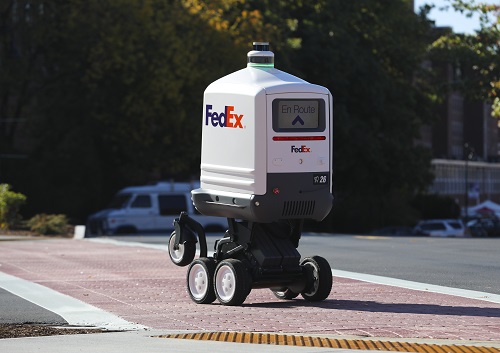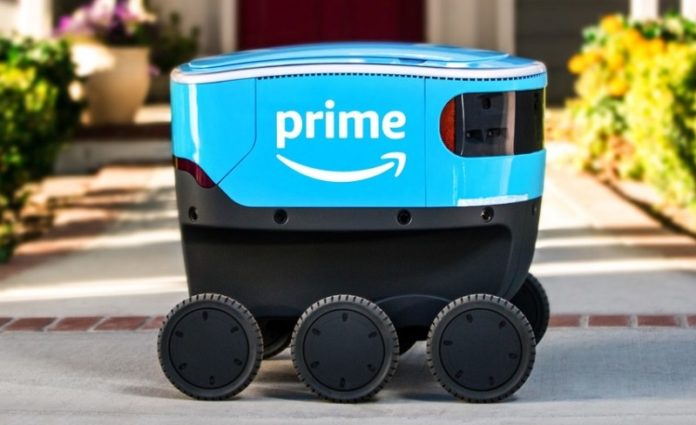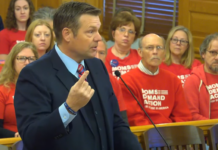First there was Scout.
Weighing in at about 100 pounds and under 3 feet tall.
Then there was Roxo.
Weighing in at about about 450 pounds and a little more than 4 feet tall.
Scout and and Roxo – one from Amazon and the other from FedEx – represent a new era of technology where automated vehicles deliver packages to the home.
Amazon and FedEx are asking the Legislature to authorize their automated delivery vehicles to operate on sidewalks and crosswalks across Kansas.
However, the legislation appears to be in jeopardy, although Amazon had a deal in the Senate last year before the session ended abruptly because of the pandemic.

Local governments pushed back against Amazon’s proposal last year because the bill in its original form would have barred them from regulating the vehicles.
Cities and counties said the bill didn’t pay enough attention to public safety, warning the vehicles could present a danger if they hit someone.
Amazon reached a deal allowing Scout on city sidewalks but giving local governments the ability to prohibit them in the interest of public safety.
That was good until this year, when FedEx’s Roxo entered the picture.
FedEx sought to expand the proposal to allow bigger and faster automated vehicles than what Amazon originally proposed.
The bill originally authorized Amazon’s electric-powered vehicles that weighed no more than 150 pounds and traveled no faster than 6 mph.
But FedEx stepped in this week, asking lawmakers to approve something broader, a bill that would authorize 550-pound vehicles running at up to 10 mph on sidewalks.
The FedEx proposal also would allow the vehicles to run along the shoulder of the road.
“Our goal is to be able to deliver goods not just in the downtown areas but in some of those suburban areas,” FedEx’s Evan Oneto told lawmakers this week.
Oneto said the design of FedEx’s delivery bot was based on wheelchairs built for paraplegic veterans returning from war, but it is more robust so it can navigate potholes and stairs.
“It has a number of safety redundancies that make it a little heavier,” he said. “Without that weight change, we would not be able to operate in the state of Kansas.”

While cities were officially neutral on the bill this year, FedEx’s broader proposal stirred more worries about the safety of the delivery vehicles.
Erik Sartorius, executive director of the League of Kansas Municipalities, said the bill already pushed the limits of public safety, even without FedEx’s proposal.
FedEx’s proposal, he said, would increase the force of a collision by 600%.
“The weight and the speed both seem well beyond the bounds of anything that we had worked in good faith with Amazon to reach agreement on,” Sartorius said of FedEx’s proposal.
“Would you rather get hit out of the blue by a 150-pound bull calf running at you, or would you rather get hit by a 550-pound steer running at you and blind-siding you?
“That’s a trick question, because you don’t want to get hit by either of them at either of those speeds,” he said.
Sartorius also expressed concern that the bill didn’t include any penalties and fines to encourage compliance with the law.
“If there’s no penalty provision, then you’re essentially being a nice neighbor making a suggestion,” he said.
While the bill requires the vehicles to have sensors to detect people, pets and vehicles, Sartorius said any failures of those systems would have an impact on who was hit.
Two year ago, FedEx’s Roxo ran into trouble in New York City where transportation officials issued a cease-and-desist letter to the company, warning that the vehicles were violating multiple traffic provisions.
Republican Rep. Virgil Peck expressed concerns about how automated delivery vehicles would know how to obey traffic signals.
Amazon has already deployed the vehicles in four markets: Irvine, California; suburban Seattle; Atlanta; and Franklin, Tennessee, just outside of Nashville.
Amazon said that 12 states and Washington, D.C., have passed laws allowing automated delivery vehicles.
The company has been looking for “innovation-friendly neighborhoods” elsewhere to deploy what it considers another option for last-mile deliveries.
“We are starting in suburban areas but hope to expand to additional communities in the
future,” said Jeff Cleland, state and local transportation policy lead for Amazon.
“Suburban sidewalks are some of the least utilized infrastructure in certain regions,
and this is a safe, innovative and environmentally friendly last-mile delivery option,” Cleland told the committee.
The FedEx proposal makes the bill tougher to pass, said Republican Sen. Rob Olson, chairman of the Senate Commerce Committee.
“I think it makes it much more complex,” Olson said. “Do you want them running up and down the street? What if they hurt someone or hit someone?”
Cities may be officially “neutral,” but Olson said they seemed to leaning against the idea of authorizing the vehicles.
“They really sounded like they’re not too interested in having it,” he said.
He also pointed to concerns from labor unions that the automated delivery vehicles would cost jobs, something Amazon and FedEx said would not happen.
More wonkishly known as a “personal delivery device,” Amazon’s Scout is the size of an ice cooler and travels at about 3 mph – a walker’s pace.
An Amazon van drops off the delivery robots in the neighborhood where deliveries are scheduled.
The electrically powered vehicles primarily run on neighborhood sidewalks, although they can reroute onto the road if they encounter obstacles.
While the vehicle is equipped with sensors so it can dodge sidewalk hurdles, Amazon officials have conceded the delivery robot is not suited for every neighborhood, especially those without sidewalks.
The robot even became a pop star when it appeared on “Ellen.” The host and the television audience reacted as if it were a cuddly pet.
Democratic state Rep. Tom Holland asked whether the bill would give preferential treatment to one commercial vehicle over another, especially if it put jobs at risk.
“My concern on this is that the proverbial nose is under the tent. Once these things get entrenched and become pervasive, there is a societal cost.
“I just hope we all understand what we’re getting involved with this, particularly in terms of potentially displacing Kansans out of their job.”
















